Overview
CRM software, or Customer Relationship Management software, plays a crucial role for organizations striving to manage client interactions effectively. It centralizes data and automates tasks, enhancing service and driving profitability. This means that CRM systems not only improve operational efficiency but also foster customer loyalty and retention. Furthermore, companies utilizing well-integrated CRM solutions have reported significant revenue growth, reinforcing the reliability and effectiveness of these systems. Have you considered how a CRM could transform your organization’s client interactions?
Introduction
In the ever-evolving landscape of business, Customer Relationship Management (CRM) software emerges as a cornerstone for companies aiming to enhance customer interactions and drive growth. This software centralizes data, automates processes, and provides insights into customer behavior, making CRM systems essential tools for fostering strong relationships and boosting satisfaction.
As organizations face the challenges of implementing effective CRM solutions, the demand for innovative technologies continues to rise. This is particularly true as businesses strive to meet the diverse needs of their clientele.
Furthermore, the impact of CRM software extends across various industries, shaping the future of customer engagement in profound and transformative ways. This means that embracing these tools is not merely a choice; it is a strategic necessity for success in the competitive business environment of 2025 and beyond.
Defining Customer Relationship Management (CRM) Software
The meaning of CRM software refers to a crucial technology that enables organizations to effectively manage their interactions with both existing and potential clients. By centralizing client data, monitoring interactions, and automating various tasks, CRM solutions streamline processes, enhance service, and ultimately drive profitability. These systems serve as a central repository for storing vital client information, interaction histories, and communication preferences, which enables businesses to cultivate stronger relationships and enhance satisfaction.
In 2025, the adoption of CRM software remains essential, with only 28% of organizations expressing satisfaction with their tools for creating a shared, centralized view of clients. This statistic underscores the pressing need for improved CRM solutions, particularly as 72% of sellers report requiring multiple displays to coordinate their sales processes effectively. The retail sector exemplifies this trend, with 18% of retail companies utilizing CRM software to enhance client engagement and streamline operations.
Successful executions of CRM platforms have shown considerable effects on relationship management. For example, Zendesk, a leader in client experience management, has achieved remarkable growth, boasting a market valuation of $10.2 billion and serving over 178,000 companies. In 2022, Zendesk generated $1.58 billion in revenue, reflecting a robust trajectory in the CRM market and highlighting the effectiveness of well-integrated CRM solutions.
As we examine the trends influencing CRM software in 2025, companies are increasingly acknowledging the significance of these systems in improving client satisfaction. Expert opinions emphasize that effective CRM software not only improves operational efficiency but also fosters loyalty and retention among customers. Daniel Ruby, a content writing expert, observes, "With over 10 years of experience in content writing, I specialize in diverse topics such as E-commerce, Social Media, and SaaS," emphasizing the significance of CRM in various professional contexts.
The ongoing evolution of CRM technology, including advancements in automation and data analytics, positions these tools as indispensable assets for organizations aiming to thrive in a competitive landscape.
In summary, the meaning of CRM software is that it is not just a tool but a strategic necessity for organizations in 2025. Its ability to centralize client information, streamline processes, and enhance interactions makes it a cornerstone of successful enterprise operations.
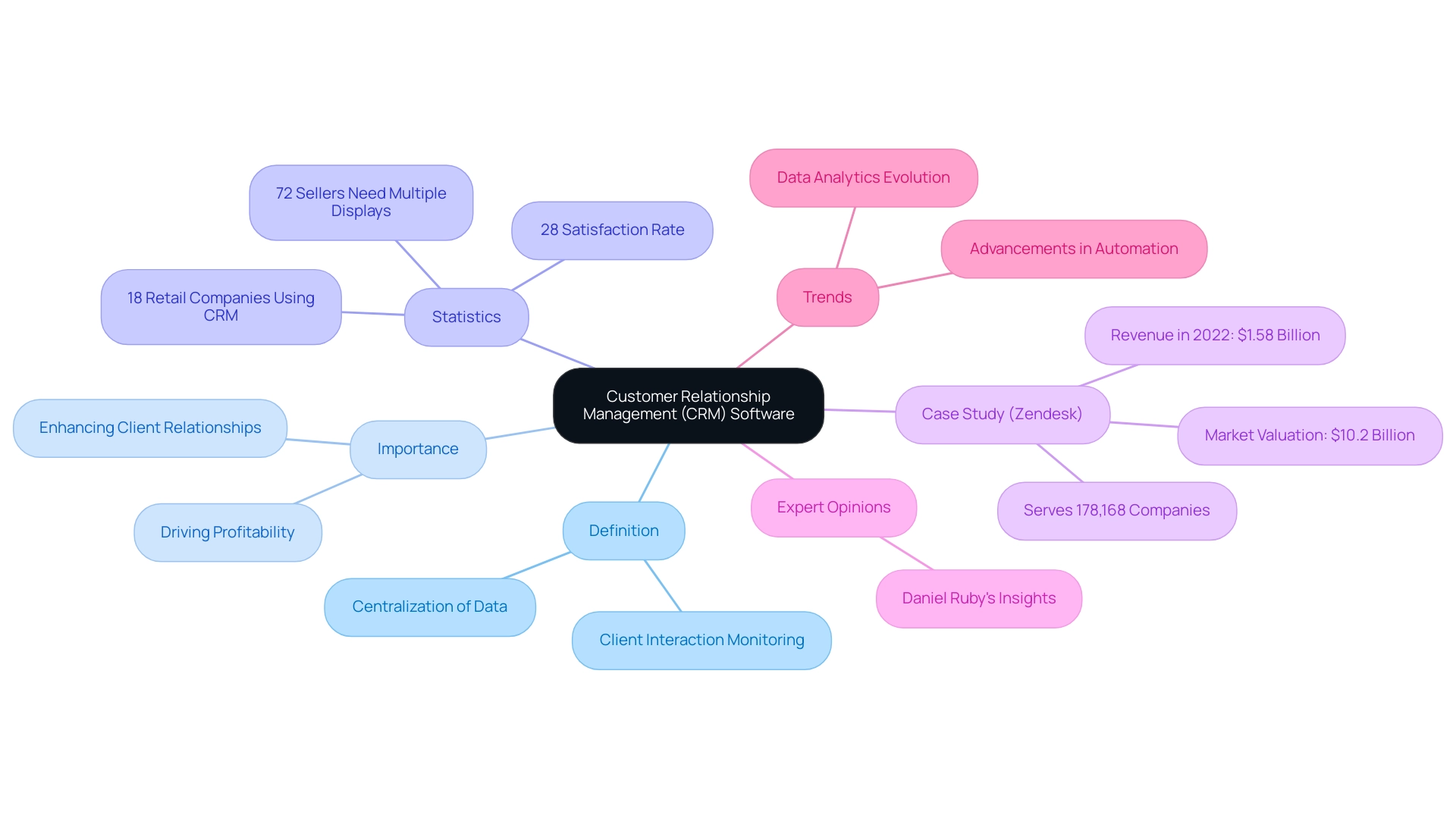
Types of CRM Systems: Operational, Analytical, and Collaborative
The meaning of CRM software encompasses crucial instruments for enterprises, classified into three main types: operational, analytical, and collaborative.
Operational CRM emphasizes the automation and optimization of client-facing processes, including sales, marketing, and client service. This type enhances efficiency by managing interactions and transactions, allowing organizations to respond swiftly to client needs.
Analytical CRM delves into client data analysis, providing insights into client behavior and preferences. By utilizing this information, organizations can make informed choices that enhance client satisfaction and loyalty. In 2025, the integration of analytics and AI is expected to play a pivotal role in maximizing the value derived from these systems.
Collaborative CRM facilitates seamless communication and collaboration among various departments within an organization. This ensures that all teams are aligned in their customer engagement efforts, leading to a more cohesive approach to managing customer relationships.
Each type of CRM software serves a distinct purpose, significantly enhancing an organization's ability to manage customer relationships effectively. For instance, operational CRM platforms have been shown to enhance sales processes, while analytical CRM solutions can lead to better-targeted marketing strategies. In 2025, statistics indicate that a significant percentage of enterprises are utilizing these systems, with operational CRM being the most widely adopted type, followed closely by analytical and collaborative systems.
Despite the advantages, many organizations face challenges in CRM implementation, such as low adoption rates and user training issues. Training and user adoption are viewed as the biggest hurdles in CRM implementation, with 25% of organizations identifying these factors as their primary challenges. Addressing these challenges is crucial for optimizing CRM performance, as incomplete or inaccurate data about clients can hinder effectiveness.
Expert insights reveal that while only 7% of CRM users find tool complexity to be a major problem, training and user adoption remain significant hurdles. Comprehending these dynamics is crucial for organizations aiming to utilize CRM tools to their maximum capability.
Furthermore, the focus on security is vital, particularly for freelancers who are worried about data privacy. Ensuring that CRM systems have passed rigorous assessments to protect user data is essential for maintaining trust and integrity in client relationships.
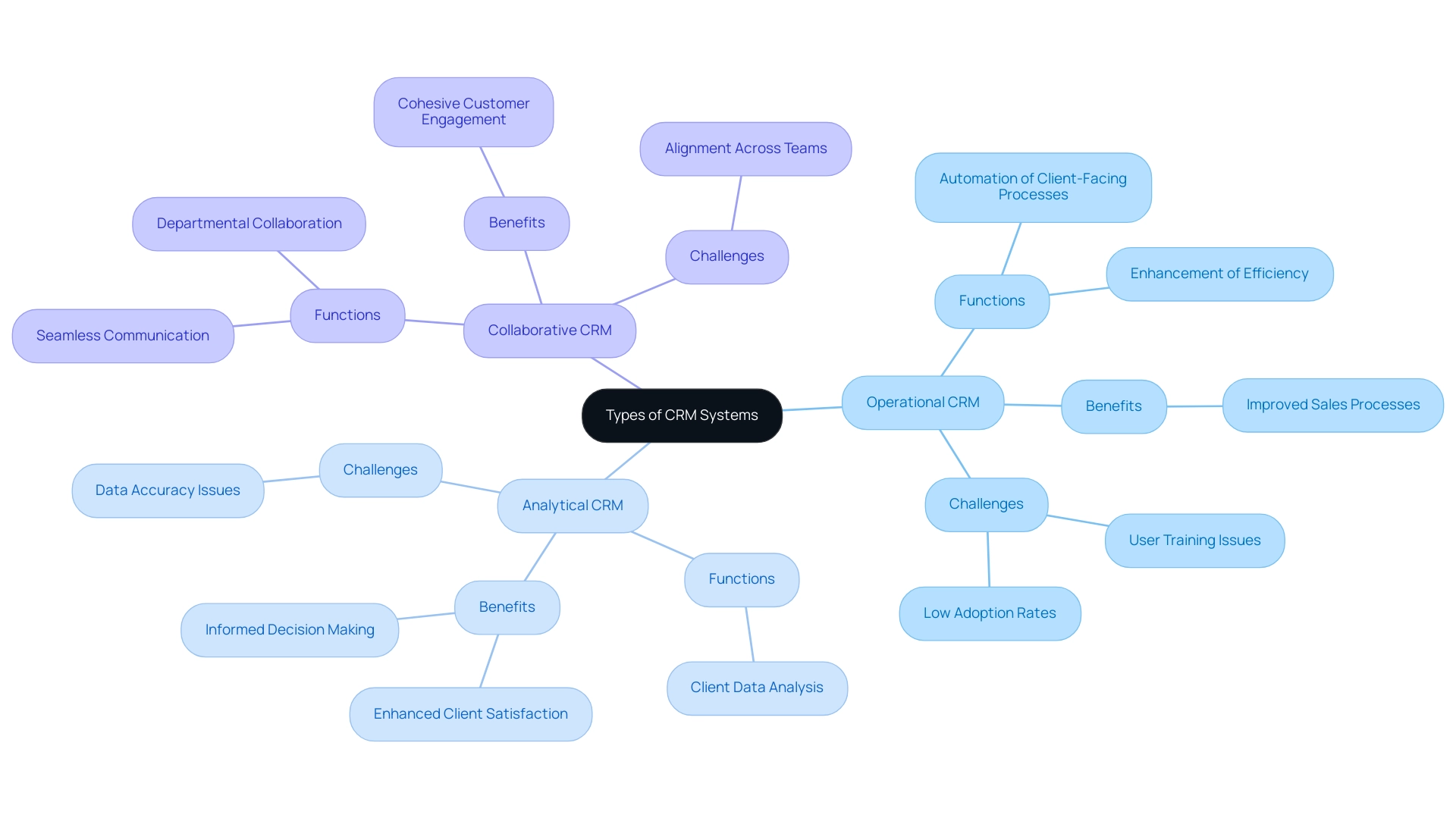
Benefits of CRM Software for Businesses
The meaning of CRM software encompasses numerous benefits for freelancers and small enterprise owners, particularly in enhancing client satisfaction, streamlining communication, and driving sales growth. By centralizing customer data, organizations can achieve a comprehensive view of their interactions, fostering more personalized and effective communication strategies. This is crucial in a competitive landscape where 83% of senior executives acknowledge challenges in encouraging staff to utilize CRM tools effectively.
Furthermore, CRM systems automate repetitive tasks, such as invoice processing and data entry, freeing up valuable time for teams to focus on nurturing client relationships rather than being mired in administrative duties. For freelancers, this translates to more time devoted to client work and growth. As Georgi Knyazhev, a freelancer, states, "Instead of spending 3 hours each month searching for and collecting invoices for my companies in Estonia, I now spend just 5 minutes. It's a huge time saver." This illustrates the tangible benefits of using CRM software in practical terms.
In addition to this, statistics reveal that 23% of users encounter difficulties with manual data entry, while 17% struggle with tool integration, underscoring the need for efficient CRM solutions. Additionally, only 18% of users believe that mobile CRM has minimal or no impact, highlighting the importance of effective CRM strategies.
The analytical capabilities of CRM software provide critical insights, enabling organizations to identify trends and areas for improvement. This data-driven approach is essential for fostering growth; studies indicate that effective CRM implementation can significantly enhance sales performance. In 2025, companies leveraging CRM systems reported a marked increase in sales growth, demonstrating the software's pivotal role in driving revenue.
However, challenges remain. Case studies illustrate that 90% of organizations do not fully utilize CRM solutions, often due to low adoption rates and user training issues. These challenges can hinder optimal performance, making it essential for freelancers and small enterprise owners to select the right CRM software.
John Peterson, a Senior Accountant at Bolt, highlights this, saying, "This product has been a game-changer for our accounting team! Locating invoices for our monthly reports is now easy, and the enhanced communication with owners has optimized our workflow."
In summary, CRM software not only streamlines operations but also enables freelancers and small entrepreneurs to grow their ventures effectively while maintaining high levels of client satisfaction. By tackling the challenges and utilizing the advantages of CRM, users can improve their client relationships and stimulate growth, just as Jan Džemesjuk, a Creative Producer & Freelancer, notes: "I am glad that Kulud helps me with a big part of the bookkeeping process.
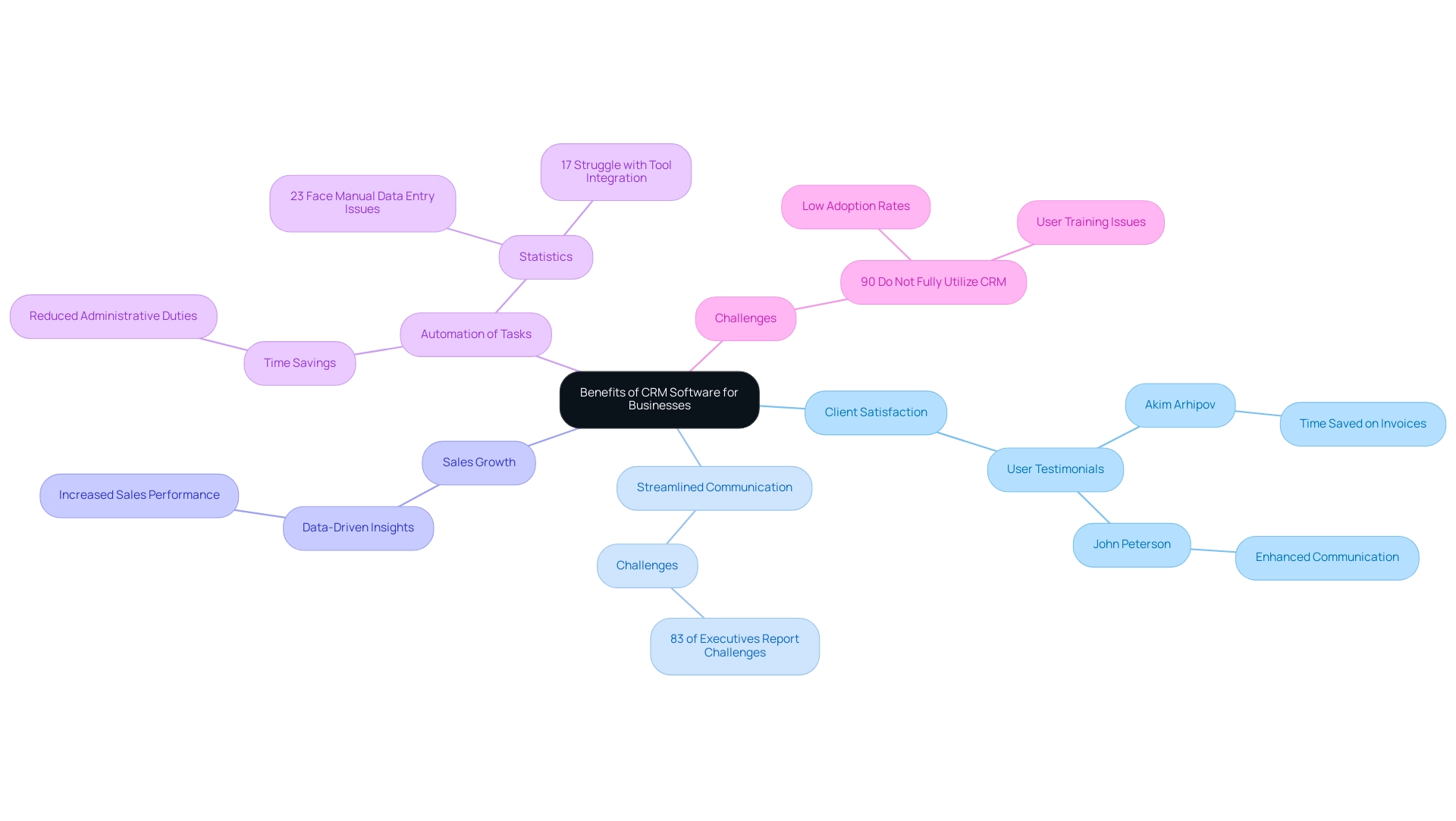
Key Features of Effective CRM Software
Understanding the challenges freelancers face in managing expenses is crucial. Effective CRM software not only optimizes client relationships but also enhances organizational operations. Key features typically encompass:
- Contact management
- Sales automation
- Analytics
- Robust integration capabilities
Contact management systems enable organizations to efficiently store and organize client information, ensuring that essential data is readily accessible.
Sales automation features streamline the sales process by tracking leads, managing follow-ups, and automating routine tasks, significantly enhancing productivity. Analytics capabilities are essential, providing deep insights into customer behavior and sales performance, empowering organizations to make informed, data-driven decisions. For instance, CRM tools can achieve up to 42% greater accuracy in sales forecasting, allowing organizations to respond proactively to market changes and refine their strategies accordingly.
Furthermore, integration capabilities enhance CRM systems' functionality by enabling seamless connections with other tools and platforms, such as email marketing software and accounting systems. This interconnectedness is particularly advantageous for freelancers and small enterprise owners, as it streamlines workflows and enhances customer engagement.
In this context, Kulud distinguishes itself with its automated expense management solution, offering features like automated receipt capture and bank transaction matching, which significantly streamline financial processes. Freelancers can log in with their professional email, connect their bank accounts, and have Kulud automatically match invoices with transactions, making expense tracking effortless. Additionally, the automatic search feature allows users to quickly capture invoices and receipts, enhancing the efficiency of expense management.
With easy exports for VAT or annual reports, managing financial data becomes straightforward, ensuring freelancers can meet their reporting requirements without hassle. As the global AI in CRM market is projected to reach $48.4 billion by 2033, the demand for sophisticated CRM solutions is on the rise. Freelancers should prioritize features that facilitate effective contact management, as this is critical for maintaining strong client relationships. In 2025, the significance of contact management in CRM will be underscored by the need for personalized communication and targeted marketing efforts, essential for growth.
Moreover, security is a paramount concern for freelancers managing sensitive client information. Kulud's advanced encryption and its completion of a Cloud Application Security Assessment (CASA) by Google ensure that user data remains confidential and protected, fostering trust and reliability in client relationships. Kulud is built by top founders and tech professionals from the Baltics & Nordics, enhancing its credibility and appeal to users seeking reliable financial management solutions.
As Reeve Lui, Founder of AsterSense, states, "My expertise lies in crafting tailored solutions that enhance your operations and increase the effectiveness of your client engagement and marketing efforts." This highlights the importance of seamless integrations in CRM implementation, which can significantly benefit freelancers.
In summary, the meaning of CRM software emphasizes that it not only streamlines operations but also boosts client interaction, making it a crucial tool for freelancers and small enterprise owners seeking to flourish in a competitive environment. Additionally, features like Kulud's automated invoice processing and smart reconciliation further support freelancers in efficiently managing their financial data.
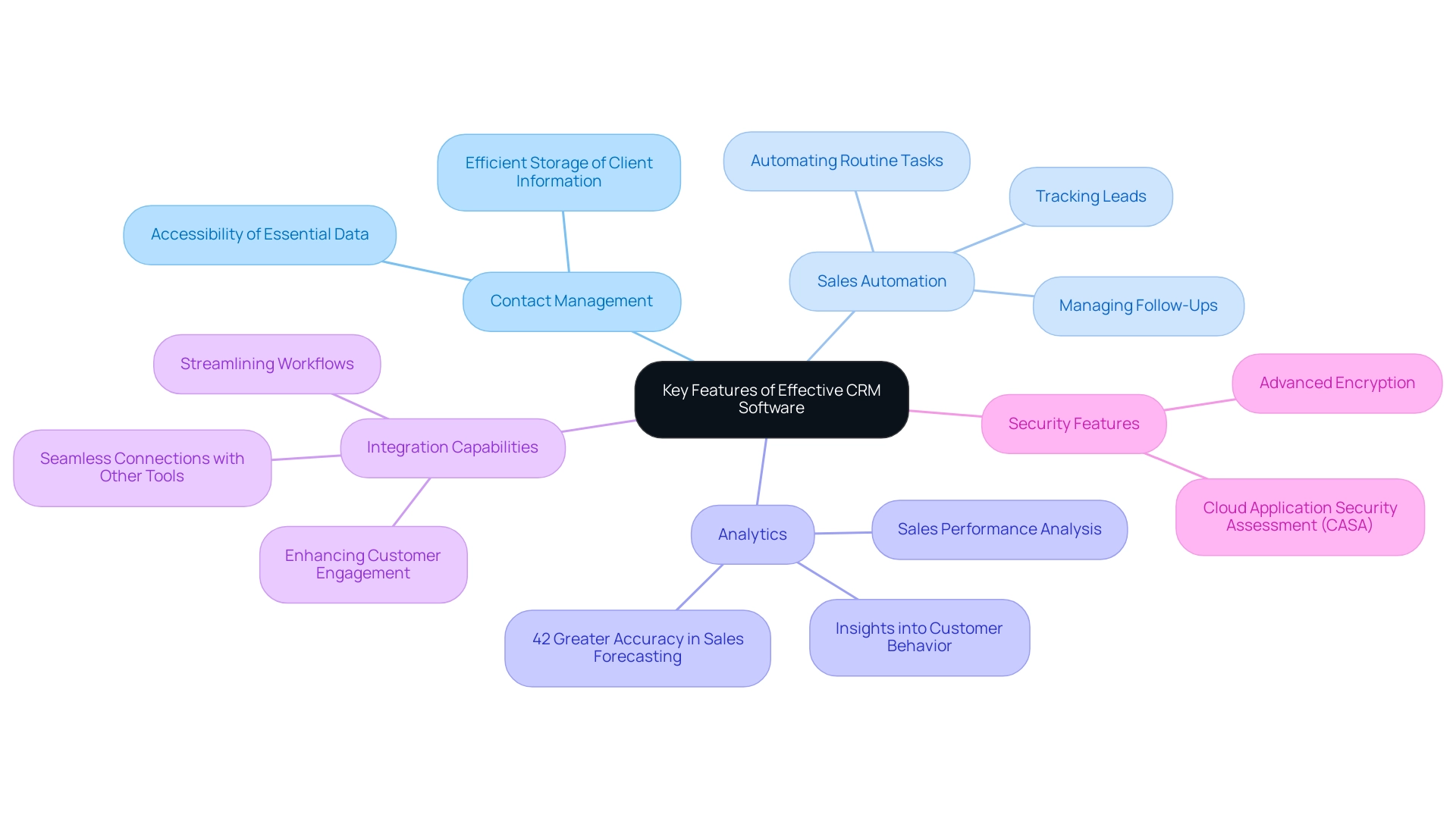
Enhancing Customer Experience Through CRM Solutions
Understanding the meaning of CRM software is essential for enhancing client experience, equipping companies with the necessary tools to comprehend and meet client needs effectively. By centralizing client information, these platforms enable businesses to tailor interactions and adjust their offerings to individual preferences. This degree of personalization not only cultivates stronger relationships but also significantly enhances customer loyalty.
In fact, companies that prioritize personalization can drive 40% more revenue compared to their slower-growing counterparts, highlighting the financial advantages of a customer-centric approach.
Furthermore, the benefits of CRM systems are underscored by user testimonials from Kulud. Georgi Knyazhev, a freelancer, states, "Instead of spending 3 hours each month searching for and collecting invoices for my companies in Estonia, I now spend just 5 minutes. It's a huge time saver." John Peterson, a Senior Accountant at Bolt, adds, "This product has been a game-changer for our accounting team! Locating invoices for our monthly reports is now easy, and the enhanced communication with owners has optimized our workflow." Jan Džemesjuk, a Creative Producer & Freelancer, shares, "I just started working as a freelancer and accounting is a big and confusing task for me. I am glad that Kulud helps me with a big part of the bookkeeping process."
These testimonials effectively illustrate how Kulud transforms expense management for freelancers and small business owners, allowing them to concentrate more on growth rather than administrative tasks.
In today's market, timely communication and follow-ups are vital, ensuring that clients feel valued and heard. This transparency has become a cornerstone of trust; 94% of clients express greater loyalty to brands that are open about their policies and operations. For freelancers and small enterprise owners, grasping the meaning of CRM software to enhance client experience can lead to repeat transactions and favorable referrals, ultimately fostering sustainable growth.
Case studies indicate that organizations effectively monitoring satisfaction metrics are more likely to secure additional budgets for experience initiatives, demonstrating a clear link between satisfaction and growth. As noted in a 2018 Statista study, 85% of CRM users in the US stated that understanding the meaning of CRM software helped them achieve improved client experience as the number one benefit of using CRM. As we move towards 2025, the importance of personalized interactions in CRM solutions will only continue to rise, making it essential for businesses to adopt these options to remain competitive and responsive to customer needs.
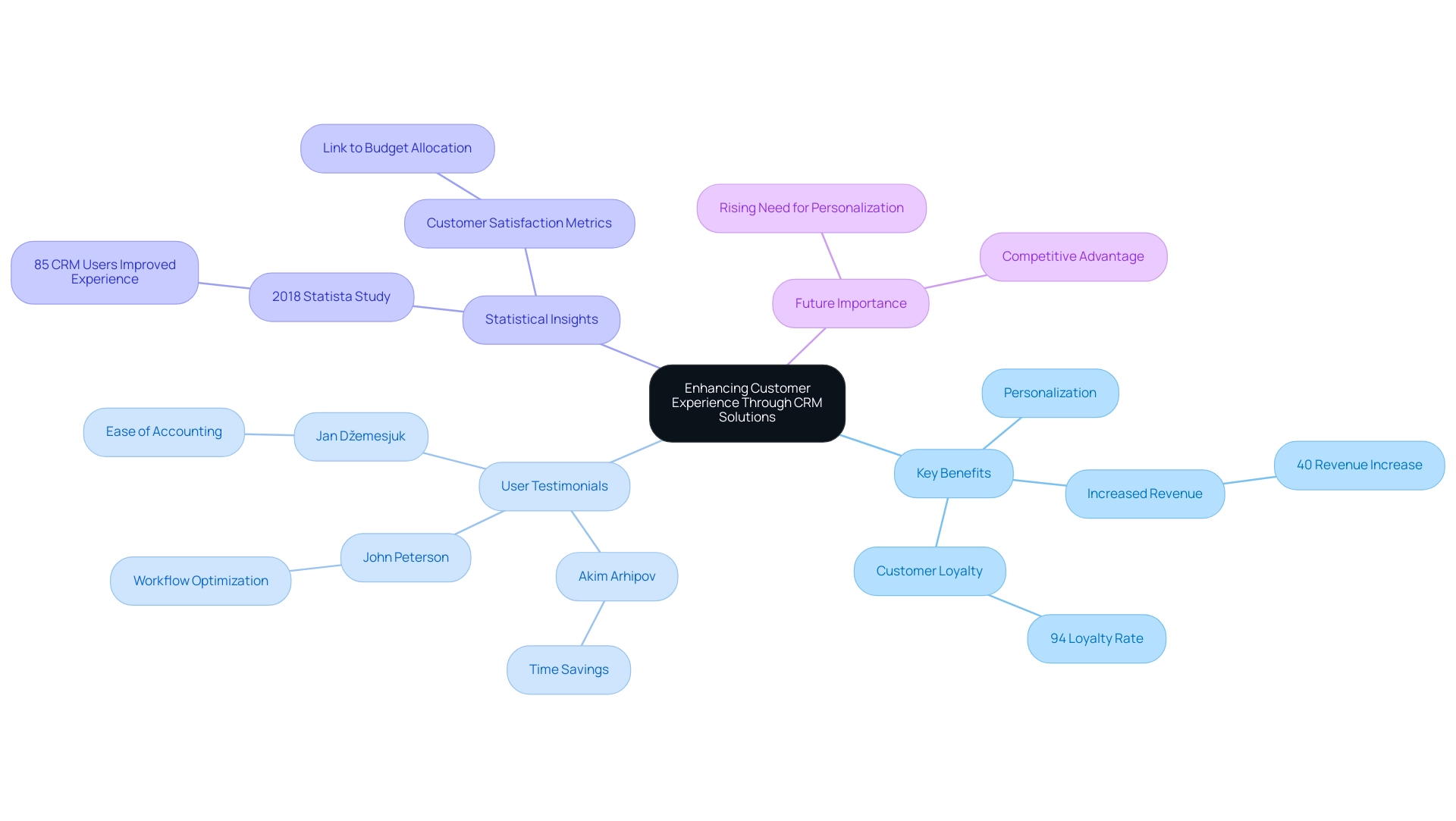
Industry-Specific Applications of CRM Software
The meaning of CRM software underscores its crucial role across various industries, each encountering unique challenges and requirements. In the healthcare sector, for instance, CRM tools are vital in managing patient interactions, streamlining appointment scheduling, and enhancing overall patient care. These systems allow healthcare providers to maintain comprehensive records of patient histories and preferences, fostering a more personalized approach to treatment.
In the retail industry, CRM solutions significantly improve engagement by enabling personalized marketing campaigns and loyalty programs. Retailers can analyze client data to customize promotions and enhance the shopping experience, ultimately driving sales and client satisfaction. The increasing trend of CRM adoption in retail is evident, with companies progressively investing in these technologies to cultivate lasting relationships with their customers.
Similarly, in real estate, CRM tools are essential for agents to effectively manage leads and track property listings. These tools facilitate streamlined communication with potential buyers and sellers, ensuring that agents can respond promptly to inquiries and maintain a competitive edge in the market.
Statistics indicate a robust growth trajectory for CRM spending across all company sizes. In the U.S., nearly 2 million companies are projected to invest approximately $15.9 billion in CRM solutions over the next year, with mid-market companies rapidly increasing their share of this expenditure. This shift emphasizes the importance of CRM systems in enhancing client relationships and operational efficiency.
Notably, SugarCRM boasts two million users worldwide and an estimated annual revenue of $108.6 million, underscoring the substantial market presence of CRM solutions.
By understanding the specific applications of CRM within their respective sectors, companies can make informed decisions when selecting solutions that align with their operational needs and client expectations. The integration of industry-specific CRM software not only streamlines processes but also empowers organizations to deliver exceptional experiences, ultimately driving growth and success. As noted by Georgi Knyazhev, testimonials from satisfied clients illustrate the transformative impact of CRM solutions, enabling users to save time and enhance communication with their clientele.
Moreover, with the increasing emphasis on security, it is crucial for small enterprises and freelancers to choose CRM solutions that have undergone thorough evaluations to protect user information.
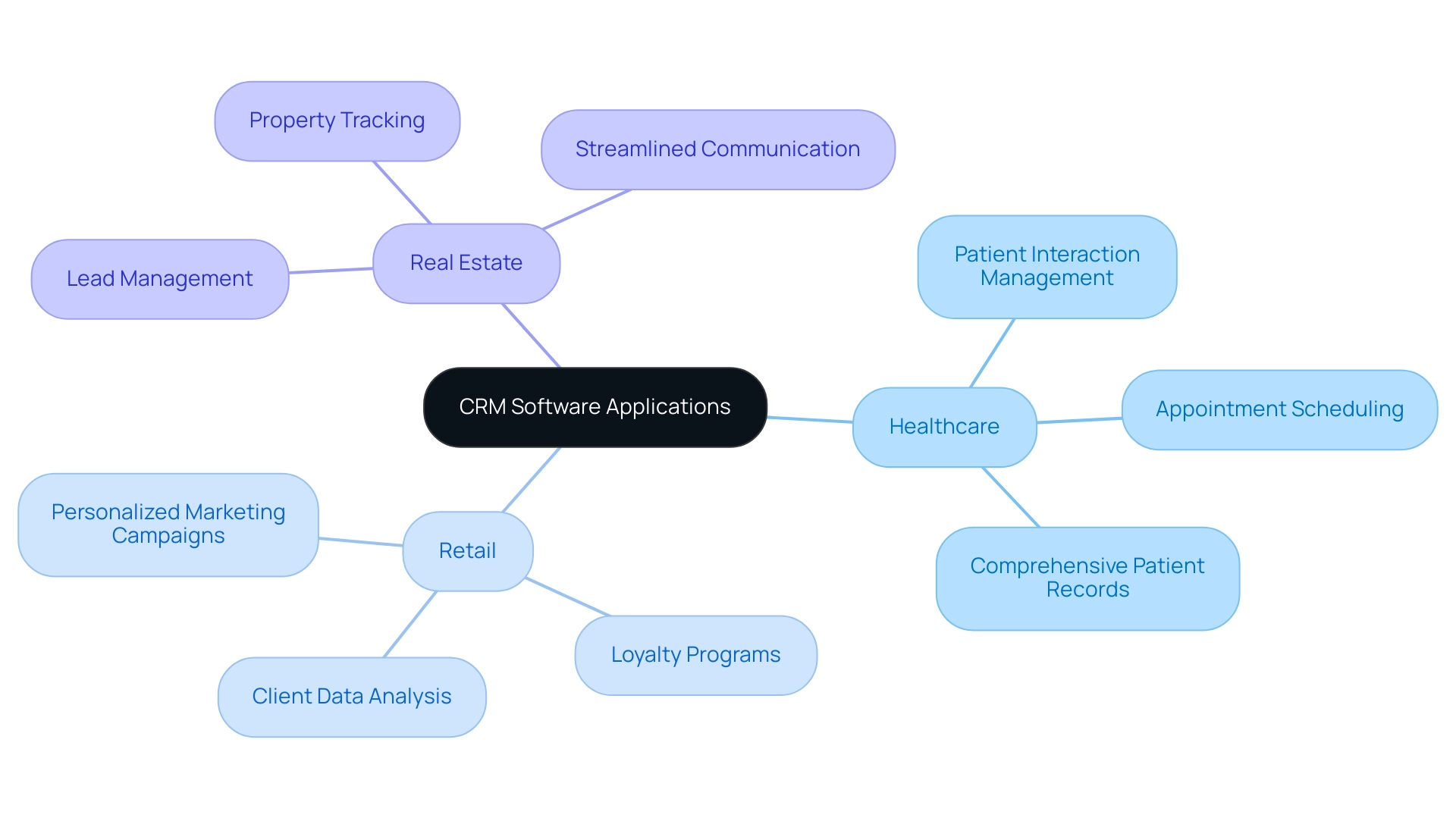
Future Trends in CRM Technology: AI and Automation
The evolving landscape of CRM technology reflects the meaning of CRM software, driven by significant advancements in artificial intelligence (AI) and automation. AI-driven CRM systems now possess the capability to manage extensive client data, producing actionable insights that assist enterprises in forecasting client behavior and customizing interactions on a large scale. This capability enhances personalization and nurtures deeper client relationships.
Automation plays a crucial role in this transformation by streamlining repetitive tasks such as data entry and follow-ups. By reducing the manual workload, businesses can operate more efficiently, allowing teams to focus on strategic initiatives rather than administrative tasks. The integration of voice AI technology, for instance, is emerging as a notable trend in CRM automation.
By 2026, the number of voice assistant users is projected to reach 157.1 million, showcasing its potential to revolutionize customer interactions through natural language understanding and personalized responses.
The impact of AI on CRM effectiveness is profound. The financial advantages of AI-driven CRM solutions underscore the meaning of CRM software, as businesses utilizing these technologies can experience revenue increases of up to 245%. As Nucleus Research states, "For every dollar invested in CRM technology, businesses achieve an average return of $8.71," further emphasizing the meaning of CRM software in terms of the efficiency and value these systems deliver.
Furthermore, hyper-personalization, driven by AI, has been shown to enhance satisfaction significantly, with companies integrating AI into their CRMs reporting a 112% increase in satisfaction.
As we look toward the future, the role of AI and automation in CRM technology will only expand. Companies that adopt these innovations will likely gain a competitive edge, positioning themselves to better serve their clients and drive sustainable growth. The ongoing evolution of CRM systems, fueled by AI, promises to reshape customer behavior analysis and redefine how businesses interact with their clientele.
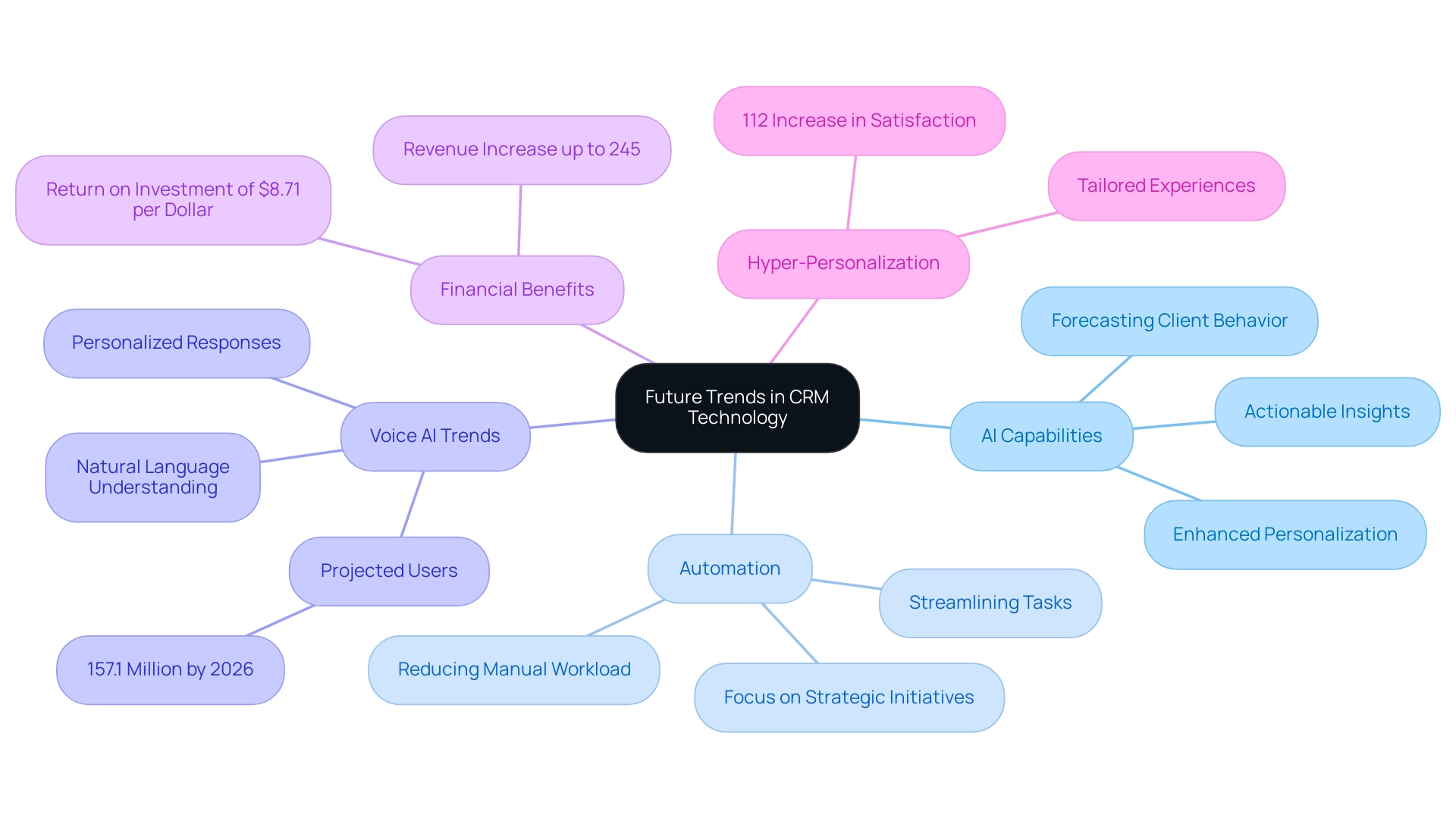
Conclusion
CRM software has emerged as an essential tool for businesses striving to succeed in a competitive environment. By centralizing customer data and automating processes, CRM systems significantly enhance customer interactions, streamline operations, and drive growth. The various types of CRM—operational, analytical, and collaborative—each serve distinct purposes that collectively empower organizations to manage customer relationships more effectively.
The advantages of implementing CRM software extend well beyond mere efficiency gains. Enhanced customer satisfaction, improved communication, and data-driven insights contribute to increased loyalty and repeat business. User testimonials underscore the transformative impact of these systems, illustrating how they enable freelancers and small business owners to save time and concentrate on core activities that drive their success.
As industries continue to evolve, the specific applications of CRM software will adapt to meet unique challenges, further solidifying its role across sectors such as healthcare, retail, and real estate. Furthermore, advancements in AI and automation are set to revolutionize how businesses engage with customers, offering unprecedented levels of personalization and operational efficiency.
In summary, embracing CRM technology is not merely a strategic choice but a necessity for organizations aiming to enhance customer experiences and cultivate lasting relationships. As businesses prepare for 2025 and beyond, investing in effective CRM solutions will be critical to achieving sustainable growth and maintaining a competitive edge in an increasingly dynamic market.



